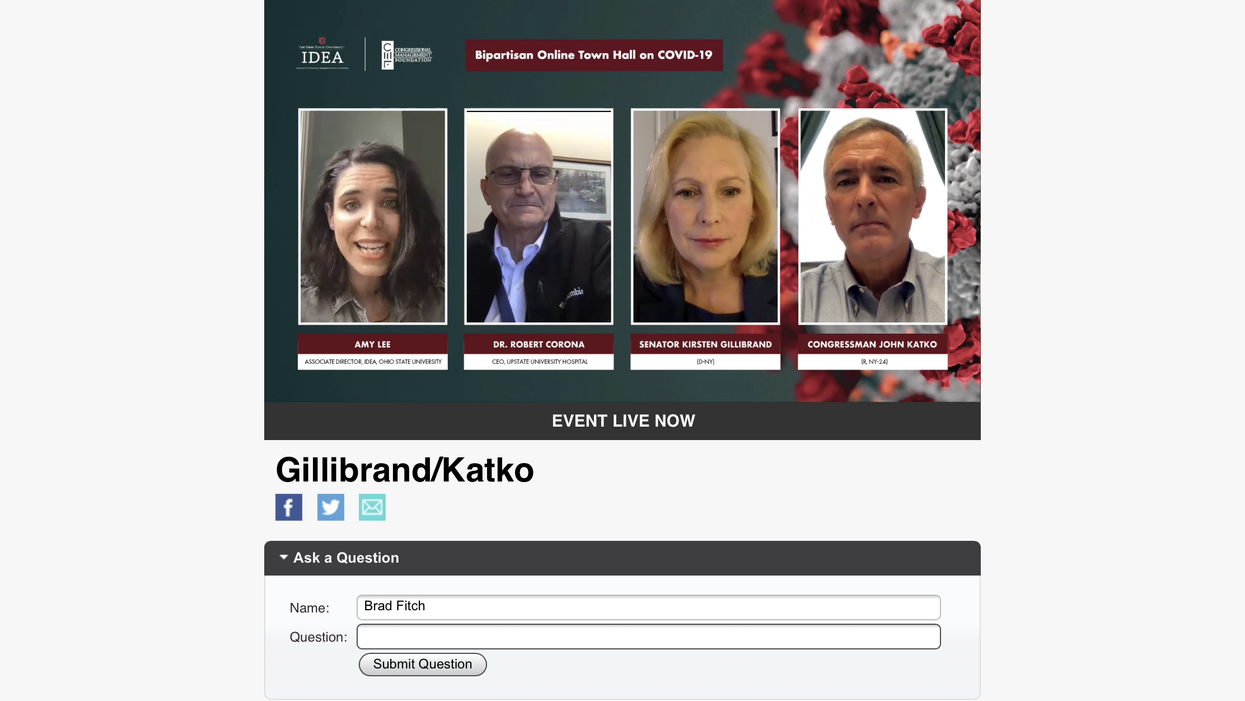How can elected officials communicate with the public in a more effective way, especially during a crisis? Making sure the message is free of partisanship looks to be key to the answer.
That's the working conclusion from more than a decade of research at Ohio State University, and this spring it's being tested in an unusual series of virtual town halls where elected officials from both parties are simultaneously addressing the coronavirus pandemic.
Persuading the public it's getting reliable information is acutely critical during a public health emergency. But even in normal times, among the top challenges to a functional democracy is an absent universe of agreed-upon facts that appear free of partisan bias — so the researchers' work holds the potential for lasting influence.
The town halls represent the most public exposure for Connecting to Congress, the research project by political scientists at Ohio State's Institute for Democratic Engagement and Accountability. The work is focused on how deliberative engagement can strengthen the relationship between lawmakers and constituents, boosting the perception of authenticity among the politicians that as a result enhances their productivity.
Lawmakers engage with constituents all the time, but IDEA's research found four factors enhance the effectiveness: making those encounters bipartisan, using an independent moderator, drilling down on a single topic in each session and committing to the exclusion of partisan talking points.
The IDEA staff joined the Congressional Management Foundation, a think tank that aims to make Capitol Hill work better, for a webinar a month ago advising House and Senate staff on best practices for online forums.
At the end, members were asked if they'd be interested in participating in a bipartisan forum on the coronavirus — and almost five dozen of them said yes. Two have been held so far, and several others are in the planning stage.
The hope, says CMF President Brad Fitch, is that they become a model for calmer and more informative interactions on top-tier policy issues between voters and their voices in Washington.
To do that, says IDEA researcher Michael Neblo, congressional town halls need to break from the current norm. The audiences now are generally confined to people who "already love their members, or are already opposed to them, and tend to be super involved in politics," and what's needed are forums that attract and then satisfy citizens who are more interested in the issues than in politics.
The first field test for the Ohio State approach occurred three weeks ago, when the virtual stage was shared by Republican Mayor David Holt of Oklahoma City and the city's first-term House member, Kendra Horn, the first Democrat to hold the seat since the 1970s. More than 7,000 watched or listened to their talk, which included the head of the local health department, Dr. Patrick McGough.
The second such virtual town hall, a week later, stands out as one of the first such meetings ever co-hosted by members of Congress from opposing parties. Democratic Sen. Kirsten Gillibrand and Republican Rep. John Katko focused on the pandemic in the part of upstate New York they both represent — with Dr. Robert Corona, CEO of Upstate University Hospital in Syracuse, acting as an independent voice of expertise.
With 3,400 of their shared constituents tuned in, the lawmakers sounded in agreement throughout, even when it came to criticizing President Trump and Senate GOP Majority Leader Mitch McConnell. As one of only two House Republicans seeking re-election this year in a district that went for Hillary Clinton in 2016, Katko has been distancing himself from the president and his divisive response to the pandemic.
"We need to unite together as Democrats and Republicans of all stripes," Katko said during the forum. "I think we're best as a country when we're working together."
In between officials answering questions, the moderators at both events asked the audience to participate in a six-question survey about Covid-19. The final query, posed at the end, was whether the attendees were hanging up with a better understanding of the virus, and what they could do to slow the spread, than they had when the town hall started — and if they would be willing to share what they learned with friends and family.
More Oklahomans (86 percent) reported a better understanding than New Yorkers (67 percent), but that's likely because New York has been the state hit by far the hardest in the pandemic and its people have been saturated with information for many weeks, researchers said. Oklahoma is one of the eight states that never imposed a stay-at-home order, while such restrictions have been in place in New York since March 22.
Town halls can often become echo chambers, Fitch said, which is why having them be a bipartisan effort is particularly important. Amid this public health crisis, effective communication is as important as laboratory analysis.
"Now more than ever, Congress must work collaboratively and utilize modern citizen engagement tools to enhance public understanding of the implications of this crisis and the issues facing the nation," he said.




















